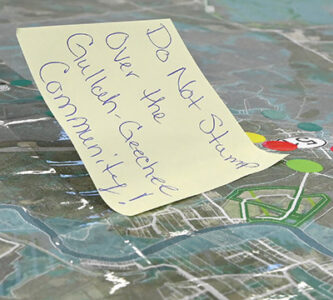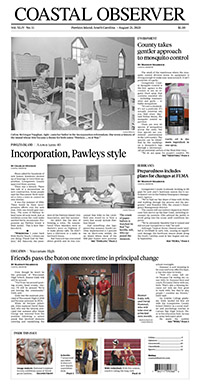Land use
For coalition, density is not a dirty word

A coalition of environmental and business groups that began organizing last year wants to make sure that an update of Georgetown County’s zoning and development regulations fulfills its promise of “smart growth.”
Thrive Georgetown is an effort of the S.C. Environmental Law Project, the Coastal Conservation League and the Pawleys Island-Litchfield Business Association. It has help from the Greenville-based Catalyst Community Consulting Group, which was hired by the Bunnelle Foundation to create a housing study.
“It seemed like there was a need, really, for some land use education to enact the comprehensive plan goals and objectives,” said Becky Ryon, north coast director for the Coastal Conservation League.
The land use element of the comprehensive plan, which provides the legal basis for the zoning ordinance, was updated at the end of last year following several years of discussion. The citizens group Keep It Green organized opposition to the update, saying it would lead to increased growth on the Waccamaw Neck.
Georgetown County has hired a Florida-based firm, Inspire Placemaking Collective, to help create a unified development ordinance that will codify the goals and objectives in the land use plan.
“We want to make sure the growth is done in a responsible way,” Ryon said.
One way to do that is by increasing density, she said, but not in the way the term was often used by opponents of the revised land use plan. It doesn’t mean increasing the overall population, but rather putting that future growth in a smaller footprint.
“Density is not inherently bad. It can mean a higher quality of life,” Ryon said. “Sprawl leads to more congestion and more strain on resources.”
Clustering future development can also reduce stormwater runoff by reducing impervious surfaces and reduce traffic by increasing connectivity, she added.
While much of the past debate focused on Waccamaw Neck, she said the western part of the county will be the site of future development, including the redevelopment of the city of Georgetown’s waterfront following the closure last year of the steel and paper mills.
“We felt like mainly the people on the Waccamaw Neck were voicing their opinions of what the future was going to be,” said Monica Whalen, a staff attorney at the S.C. Environmental Law Project. “We want to bring in more partners, representatives of the western part of the county.”
Thrive Georgetown plans to emphasize the goals in the land use plan that will protect natural resources by creating a wetlands ordinance and cultural resources by creating overlay districts for areas like Murrells Inlet, Parkersville and Plantersville.
The group envisions helping residents to use tools like the overlays zones, “show them how to be proactive,” Whalen said.
“There are a lot of good things that are happening with the land use plan,” said Kim Fox, executive director of the business association.
The coalition members started meeting last fall after the land use element was approved by the Planning Commission. Had they organized sooner, Fox said the debate over the plan might have been different. Thrive Georgetown wants to get out in front of the unified development ordinance “instead of reacting,” she said.
For the business association, the call for affordable housing is a key goal of the land use plan.
“Oftentimes that is going to mean smaller lot sizes,” Ryon said. “You can do it through no net higher density.”
The housing study by Catalyst should help with that, she said.
“We want this to be data-driven, science-based,” Ryon said. “We have a lot of studies. Those studies have largely been sitting on shelves.”
Thrive Georgetown hopes to hire a “point person” to lead its effort, Fox said. For that, it hopes to get help from Catalyst to seek grant funding.
The coalition plans to spend the summer establishing its identity through social media and start holding workshops in the fall. The plan is to bring in experts to talk about topics such as housing, wetlands and low-impact development, Whalen said.
The schedule will depend in part on the work of the county’s consultants, Inspire, which will also be gathering public input.
“We want all of Georgetown County to be the special place it is,” Ryon said. “There is a difference in how we get there.”




